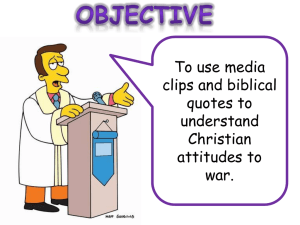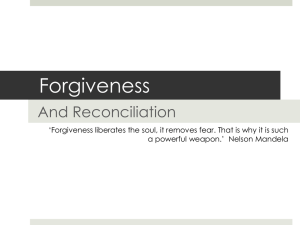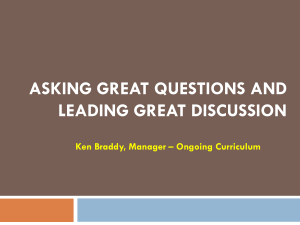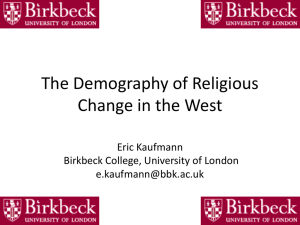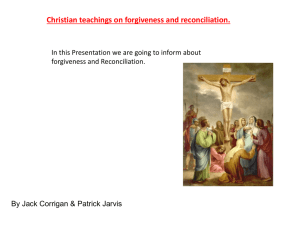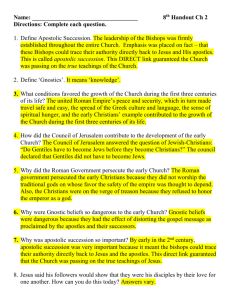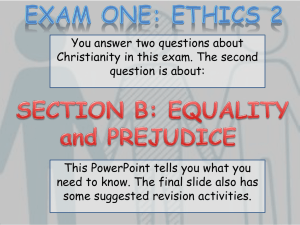Y11 Model Answers – Religion and conflict
advertisement
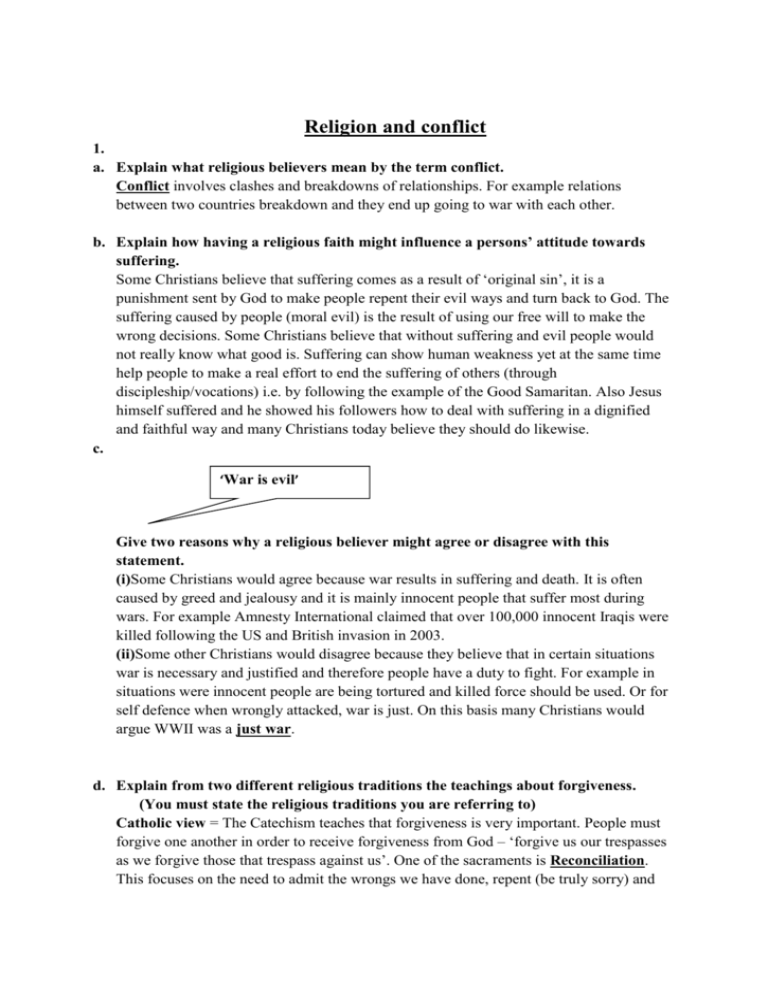
Religion and conflict 1. a. Explain what religious believers mean by the term conflict. Conflict involves clashes and breakdowns of relationships. For example relations between two countries breakdown and they end up going to war with each other. b. Explain how having a religious faith might influence a persons’ attitude towards suffering. Some Christians believe that suffering comes as a result of ‘original sin’, it is a punishment sent by God to make people repent their evil ways and turn back to God. The suffering caused by people (moral evil) is the result of using our free will to make the wrong decisions. Some Christians believe that without suffering and evil people would not really know what good is. Suffering can show human weakness yet at the same time help people to make a real effort to end the suffering of others (through discipleship/vocations) i.e. by following the example of the Good Samaritan. Also Jesus himself suffered and he showed his followers how to deal with suffering in a dignified and faithful way and many Christians today believe they should do likewise. c. ‘War is evil’ Give two reasons why a religious believer might agree or disagree with this statement. (i)Some Christians would agree because war results in suffering and death. It is often caused by greed and jealousy and it is mainly innocent people that suffer most during wars. For example Amnesty International claimed that over 100,000 innocent Iraqis were killed following the US and British invasion in 2003. (ii)Some other Christians would disagree because they believe that in certain situations war is necessary and justified and therefore people have a duty to fight. For example in situations were innocent people are being tortured and killed force should be used. Or for self defence when wrongly attacked, war is just. On this basis many Christians would argue WWII was a just war. d. Explain from two different religious traditions the teachings about forgiveness. (You must state the religious traditions you are referring to) Catholic view = The Catechism teaches that forgiveness is very important. People must forgive one another in order to receive forgiveness from God – ‘forgive us our trespasses as we forgive those that trespass against us’. One of the sacraments is Reconciliation. This focuses on the need to admit the wrongs we have done, repent (be truly sorry) and ask for forgiveness. Asking and receiving forgiveness is very important otherwise damaged relationships could never be repaired. Quaker view = Forgiveness is also very important to Quakers as it is a demonstration of love, understanding and mercy. They recognise that to build a better world people must listen to one another and show compassion to those that have did wrong but wish to make amends. Quakers seek to create a world based on justice and recognise that forgiving someone is often the first step towards creating such a world. For Quakers justice is about rebuilding and restoring it is never about revenge. They believe that if a person opens their heart to God’s spirit it will guide them towards being a more loving and forgiving person. During silent worship Quakers make a special effort to open themselves up to God’s spirit. This (d) question might be worded in such a way that you are asked to ‘Explain from two different religious traditions how an individual or a community has worked for peace’ If using a community Catholic view = Cafod is a Catholic organisation that works for justice and peace. Cafod are actively campaigning for peace in some of the worst war torn countries in the world such as Sudan and Somalia. Cafod organise prayer vigils, non-violent protests and numerous support projects aimed at helping those most affected by war and violence. Cafod offer advice and support to help end conflicts and build a just and lasting peace. Cafod aims to make the Gospel message of peace and reconciliation a reality in the world today. Quaker view = Quakers have a programme called ‘Turning the Tide’ which carries out work using the power of non-violence to turn the tide of injustice and oppression. This programme aims to build an inclusive, sustainable and fair world. This programme offers workshops, resources and advice on nonviolent activism aimed at creating a just and fair society. Their message is that protests need not be violent. There is no need to throw stones at the police or burn down shops in order to get a message across. Quakers pride themselves on their passive approach to solving problems. If using an individual Catholic view = Oscar Romero campaigned for justice and peace in El Salvador throughout the late 1970s. The government was very corrupt and treated the majority of people very badly. When the people spoke out they were often beaten, imprisoned and sometimes murdered. Some of the poor people wanted to use violence to overthrow the government. Romero refused to support anyone that used violence. He said ‘violence was not what God wanted’ and therefore supported non-violent protest only. He preached a message of peace, forgiveness and reconciliation. Even when threatened and imprisoned Romero continued to pray and work for peace. Romero was murdered whilst saying Mass yet even in this final Mass Romero called upon the soldiers as fellow Christians to obey God's higher order and to stop carrying out the government's repression and violations of basic human rights sadly these appeals fell on deaf ears. Quaker view = Eric Baker was a British Quaker and a peace maker who was one of the founders of the human rights group Amnesty International. He also served as the head of a Quaker organisation called Quaker Peace and Social Witness. The aim of this group was to promote and practice the Quaker testimonies of peace, equality, simplicity and truth. He was a pacifist and a conscientious objector during WWII. During the war he worked on the Famine Relief campaign which raised funds to buy food and other basic supplies for those suffering due to the war. While working for Amnesty International from 1961 until his death in 1976 Baker worked tirelessly for peace in various parts of the world. He also helped to make the world aware of many of the human rights abuses that were taking place. Baker is remembered today as being an honest, hard working and inspirational figure who tried to change the world for the better. e. ‘You can’t be a true religious believer if you mix with people of other religions’ Do you agree? Give reasons or evidence for your answer, showing that you have thought about more than one point of view. You must include reference to religious beliefs in your answer. Many Christians would disagree with this statement. Jesus himself mixed with Jews, Romans, Greeks and other Gentiles of mixed faiths. He did not ignore or discriminate against those with different faiths and therefore nor should his followers. In fact one of Jesus’ last instructions to his disciples was for them to ‘go out and spread the good news to all the peoples in all the nations’. Today many Christians support things like Christian Unity where different types of Christians come to work and worship together. Many Christians also work with members of other faiths such as Jews, Muslims, Hindus and Sikhs to promote interfaith dialogue in order to build trust and friendship so that people can work together to achieve common goals for the good of the whole community. Some religious believers consider their faith and way of life to be superior to others. Some Christians for example are exclusivists (they believe only Christians can go to heaven) and this attitude may prevent them working and building meaningful relationships with people of other faiths. Some Jews and some Muslims refer to people of other faiths as ‘infidels’ which means non believers and they are reluctant to mix with these people. I think it is not only possible but desirable for people to mix with people from other faiths. At the heart of every major world religion lays a basic teaching similar to the Golden Rule in Christianity – ‘treat others the way you would like to be treated’. It therefore seems to me mixing with others of a different faith is natural and very worthwhile. 2. a. Explain what religious believers mean by the term interfaith dialogue. This involves exploring common grounds between different faith groups. For example some Jews and Muslims talk with each other in Palestine in an effort to build trust and friendship and hopefully reduce levels of violence and tension. b. Explain how having a religious faith might lead some religious believers to say war is acceptable. Some Christians believe in the just war theory. This theory claims that in certain situations war is necessary – war becomes the lesser of two evils. For example if the aim of the war is to bring about justice and peace to people that are being unjustly tortured, killed and discriminated against. Some Christians might also say the use of violence was acceptable to Jesus in some situations. For example Jesus over turned the money lenders’ tables in the Temple – showing anger and aggression. He allowed his disciples to carry weapons and two of his disciples (Simon & Judas) were themselves Zealots (members of a group that used violence against Romans). c. ‘Religious organisations should work towards reconciliation’ Give two reasons why a religious believer might agree or disagree with this statement. (i)Some Christians would agree because they believe that God wants everyone to live in peace and harmony therefore they should work towards this end. For example the Corrymeela Community in the north of Ireland is a Christian peace and reconciliation organisation that promotes reconciliation between the Catholic and Protestant communities in the hope of overcoming years of hatred and division. (ii)Some other Christians agree because if reconciliation does not take place between individuals, communities and sometimes nations evil wins and conflict continues. In South Africa Archbishop Desmond TuTu was a key figure in the Truth & Reconciliation process that went on between blacks and whites aimed at building a more peaceful and loving future. d. Explain from two different religious traditions how believers might take practical action to relieve suffering. (You must state the religious traditions you are referring to) Catholic view = Catholics believe they have a moral duty to care for those less fortunate than themselves –‘love your neighbour’, ‘treat others the way you would like to be treated’ etc. Cafod is a Catholic charity that aims to overcome suffering abroad. They raise money to feed, clothe and shelter people. They also provide long term aid by providing education, training and technical assistance so that communities can become self sufficient. Quaker view = Quakers try to show their faith through practical action. They organise and support many initiatives aimed at ending human suffering and social injustice. One such project is Quaker Housing Trust. This is a project which supports homeless people by giving advice, support, loans or grants that would be difficult to find elsewhere. Through social witness they aim to help homeless people of any age, colour or creed when they are vulnerable. They believe that without a home a person will struggle to find God living inside them. e. ‘Forgiveness is a sign of weakness’ Do you agree? Give reasons or evidence for your answer, showing that you have thought about more than one point of view. You must include reference to religious beliefs in your answer. Most Christians would disagree. Jesus himself taught his followers about the need to forgive others. When the prostitute was about to be stoned to death Jesus said; ‘let he who is without sin cast the first stone’ which was a reminder that we are all sinners and all in need of forgiveness. Jesus also forgave Peter for denying him and even when on the cross Jesus cried out; ‘father forgive them for they know not what they are doing’. Many Christians today value forgiveness because it allows for reconciliation. If people refuse to forgive one another then hatred and bitterness take over. People will become obsessed about getting revenge and ‘two wrongs don’t make a right’ or as Gandhi once said ‘an eye for an eye simply leaves everyone blind’. Some Christians think that only God has the right to forgive and that punishment is far more important and worthwhile than forgiveness. In the Old Testament God punished sinners. For example he destroyed the army following Moses. He also destroyed the cities of Sodom and Gomorrah for the amount of sinning taking place there. Some Christians believe certain sins cannot be forgiven and this is why they support the death penalty for certain crimes. They claim to forgive murderers and rapists is not only a sign of weakness but also irresponsible as these criminals might repeat their actions in the future. I think having the grace to forgive is a sign of strength not weakness. As Alexander Pope once famously remarked ‘to err is human to forgive is divine’. I want God and others to forgive me when I make mistakes therefore it is important that I too am willing to forgive. 3. a. Explain what religious believers mean by the term just war. This refers to a war undertaken to protect the innocent or those being violated and to restore justice and peace. An example of a just war was WWII. The allies fought against Nazi injustices such as the holocaust. b. Explain how having a religious faith might inspire a person to support those that are suffering. Christians believe that they have a moral responsibility to help those that are suffering – ‘treat others the way you would like to be treated’, just like the Good Samaritan did. Jesus himself cured the blind and lepers. He made the paralysed walk again and he fed the hungry. These examples inspire many Christians to take up a vocation or career to help people suffering i.e. nursing, charity worker or peace keeper. Even Christians that perhaps do not dedicate their whole life to supporting those that suffer might make a special effort at certain times of the year for example Lent. Many schools and parishes have Good Shepherd appeals or Good Samaritan initiatives aimed at overcoming human suffering. c. ‘Pacifism is a waste of time’ Give two reasons why a religious believer might agree or disagree with this statement. (i)Some Christians believe pacifism is a waste of time in certain situations because it will not protect the innocent or allow for justice. This is why many Christians support the just war theory. Evil aggressors must be stopped and ‘if you are not part of the solution then you are part of the problem’. It was on this basis that many Christians fought against the Nazis. (ii)Some other Christians such as Martin Luther King believe that violence can never be justified. They gain inspiration from parts of the Gospel such as when Jesus said things such as ‘love your enemy’, ‘if someone strikes you on one cheek offer them the other’ and ‘he who lives by the sword will die by the sword’. These people support pacifism rather than conflict. d. Explain from two different religious traditions why terrorism is not acceptable. (You must state the religious traditions you are referring to) Catholic view = The Catechism of the Catholic Church teaches that it is wrong to deliberately intimidate and hurt others. Christians are supposed to treat others with dignity and respect and in doing so uphold the teachings of ‘love your neighbour’ and ‘treat others the way you would like to be treated’. Catholics believe the unjust killing of people is a mortal sin because it breaks the commandment ‘thou shall not kill’. Catholic leaders such as Oscar Romero have spoken out against those that use terror in order to control others such as the government in El Salvador in the late 1970s. Quaker view = From early in their 350 year history, Quakers have taken a clear stand for peace. Their words and actions in opposition to war and in support of peace have come to be known as 'the Quaker peace testimony'. Quakers are committed to working for peace and justice through nonviolent social change. Quakers seek to wage peace at all levels of society, from teaching mediation to school children to being active in disarmament. Acts of terror go against everything Quakers stand for. Quakers will therefore condemn all acts of terror and seek to act in non violent ways that overcome terrorism at home and abroad. e. ‘Religious organisations aren’t likely to create peace’. Do you agree? Give reasons or evidence for your answer, showing that you have thought about more than one point of view. You must include reference to religious beliefs in your answer. Many Christians would disagree with this view and that is the reason why so many are prepared to join and support various organisations based on Christian values that seek to bring peace to various parts of the world. For example Pax Christi is an organisation working in the Middle East that has successfully worked to bring about cease fires in Palestine and Syria. They arrange for representatives from different sides to meet and speak in the hope of ending conflict on a permanent basis. The CHristian International Peace Service (CHIPS) is another organisation that has helped to end conflicts across the world over the last 40 years. They are currently focusing efforts on creating and maintaining peace in Uganda. They often act as mediators to help resolve issues between different tribes and political groups. Quaker organisations have for many years helped to establish and maintain peace in different parts of the world. Quakers are often trusted because they do not get involved in politics and are viewed as neutral. This gives them an advantage that most other organisations do not have and therefore increases their chances of being successful. Some people disagree with this statement. They feel that religious organisations may be well intentioned but they lack the resources and authority to be truly effective. Instead more powerful third parties are needed to bring peace such as the United Nations or NATO. If those fighting refuse to listen then they can be forced to stop fighting by an even greater power. I think religious organisations can and do help to create peace across the world. Most people in the world have a faith of some description and most faiths value justice and peace. This means that people of faith can work together through interfaith dialogue to build bridges and help stop needless wars and suffering. 4. a. Explain what religious believers mean by the term non-violent protest. This involves showing disapproval without damaging property or causing any threat. Martin Luther King organised a bus boycott which was a peaceful demonstration against discrimination. b. Explain how having a religious faith might influence a persons’ attitude towards peace. Many Christians pray and work for peace in their everyday lives. In the bible it says ‘blessed are the peacemakers’ and Jesus himself told his followers to ‘love one another’. He even said ‘love your enemy’. This is very difficult but can be very worthwhile and rewarding. By being peaceful to your neighbour, foreigners and even your enemy helps create the kingdom of God here on earth. Peace allows people to live without fear and this is why Christians support and encourage peace in the world today. Where conflict does exist Christians will try to act in ways that will bring about peace and reconciliation. c. ‘People are the cause of suffering-not God’ Give two reasons why a religious believer might agree or disagree with this statement. (i)Some Christians would agree with this view because moral evil is the result of human actions. Examples of moral evil include stealing, raping and killing. These acts are carried out by people with free will. These people choose to act in this way therefore they are responsible for the suffering caused not God. (ii)Some other Christians might disagree with this view because natural evil causes suffering and this is not caused by people. For example the Boxing Day tsunami in 2004 killed almost 300,000 people and left thousands more injured and homeless. This was not caused by people. In fact some would describe it as an ‘act of God’. d. Explain from two different religious traditions the attitude towards non-violent protest. (You must state the religious traditions you are referring to) Catholic view = The Catholic Church encourages its followers to stand up and speak out against injustice in a non violent manner. The Catechism teaches about the importance of social justice. These teachings echo the prophets such as Amos who wrote ‘let justice roll down like waters, and righteousness like an ever flowing stream’. Micah also wrote we must ‘act justly, love tenderly and walk humbly’. There is no room here for needless aggression and acts of violence because even those that you are protesting against are children of God. Catholics try to recognise Christ in others and therefore treat them with dignity and respect. Peaceful protests are attempts to remain dignified and respectful to others in the hope that conflict and injustices will end and this will eventually lead to reconciliation. Quaker view = One of the core testimonies of the Quaker faith is their total commitment to non violence. The Quaker way implies non-violence in thought word and deed. Most Quakers refuse to fight in wars, and make clear their opposition to all preparations for it. The Society of Friends (Quakers) is regarded as one of the traditional ‘peace churches’. Quakers have a long history of seeking peaceful solutions to problems and tensions that arise in the world. During WWI & WWII Quakers on mass refused to fight much to the annoyance of the government, the army and many others. Some though did carry out heroic work as front line ambulance workers risking their lives to tend to the needs of all soldiers. Their commitment to pacifism is admired by many worldwide. e. ‘Non-violent protests achieve nothing’. Do you agree? Give reasons or evidence for your answer, showing that you have thought about more than one point of view. You must include reference to religious beliefs in your answer. Most Christians disagree with this statement. There are numerous examples in history where non-violent protests have achieved a lot. For example Martin Luther King was a civil rights leader who refused to use violence even when he and his followers were attacked, imprisoned and in some cases killed. Eventually their efforts were rewarded and a civil rights bill was passed giving black people equality in the eyes of the law in the US. Furthermore Christian missionaries throughout Africa and South America organised nonviolent protests and campaigns highlighting social injustices and in many cases succeeded in bringing about change. People from other faiths have also held successful non-violent protests. Gandhi on several occasions refused to eat until those fighting in India stopped. As both sides had such respect for him and didn’t want him to die they did as he requested. Another example of people that use non-violent protests are Buddhist monks led by the Dali Lama. They have gained a lot of international support for their protests against human rights abuses carried out by the Chinese government in Tibet. Some people disagree with the statement. Some Christians would say that in certain situations only violent protest will work. For example Dietrich Bonheoffer was a German Christian and a pacifist who originally thought only peaceful protests was justified. However he eventually changed his mind and actively took part in a failed attempt to kill Hitler. Some Christians will also say that the fact there is a just war theory itself proves that in some cases non-violent protest will achieve nothing. I think non-violent protests can and do achieve a lot. I believe that most conflicts in the world can be solved peacefully. However I also feel that in certain extreme cases physical force is needed. When this is the case only the minimum amount of force should be used and peace restored as quickly as possible. 5. a. Explain what religious believers mean by the term pacifism. This refers to the belief that any form of violence or war is wrong. Martin Luther King always told his followers to be peaceful even when threatened or attacked by others. b. Explain how having a religious faith might influence a persons’ attitude towards forgiveness and reconciliation. Christians believe that forgiveness and reconciliation is very important because relationships get damaged. For example trust can be broken, people sometimes tell lies about others and in some cases people physically hurt others. Forgiveness is needed to rebuild the relationship. Christians believe that without forgiveness a person is unable to move on from a painful event. Forgiveness is important to create peace, particularly in situations of conflict and war. However forgiving others is difficult and sometimes Christians pray for the strength and courage to do this. Catholics have the sacrament of reconciliation which focuses on the importance of saying sorry, receiving forgiveness and rebuilding relationships. c. ‘People who suffer usually deserve it’ ’ Give two reasons why a religious believer might agree or disagree with this statement. (i)Some Christians will disagree with this view. They might refer to the phrase ‘innocent victim’ which unfortunately we hear quite a lot. The young child killed in a house fire, the mother paralysed in a car crash caused by another driver, or the father who loses his job through no fault of his own are all examples of people suffering through no fault of their own. Jesus suffered for being loving and kind as did his disciples. Other innocent victims in history include Martin Luther King, Gandhi, Nelson Mandela and countless others. (ii)Some other Christians will agree. They might say that people who suffer due to illness usually cause it due to living unhealthy lifestyles e.g. drinking, smoking, poor diets etc. Also many poor people made bad choices in life e.g. messed around in school, too lazy to look for a decent job etc. Then there are criminals who get fined, sent to prison or even executed, again they are responsible for their actions and therefore deserve the punishments. Finally there are those Christians that will say all human suffering is the result of original sin. d. Explain from two different religious traditions the attitude towards war. (You must state the religious traditions you are referring to) Catholic view = The Catechism of the Catholic Church teaches that every effort must be made to avoid war because of the suffering wars cause. However Catholics accept that in some extreme cases war is sometimes necessary (‘the lesser of two evils’). In such cases the just war theory must be followed. This outlines rules that must be followed before, during and after the war. For example a war must be the last resort, it must be waged by a lawful authority and it should bring about good. The war should also be winnable, minimum force used and only legitimate targets attacked. Quaker view = A basic belief of the Quaker way of life is their commitment to nonviolence. The vast majority of Quakers are absolute pacifists. They refuse to accept that violence can ever be the answer. Their attitude is simply that violence of any sort increases the amount of suffering that exists in the world and is therefore wrong. When conflict occurs Quakers support dialogue (talking), they promote things such as compromise, understanding, patience and forgiveness. They believe that alternatives to war can always be found even though this may take considerable time and effort. This is why many Quakers are actively involved in peace initiatives across the world today for example in Palestine where they promote interfaith dialogue between Jews and Muslims. e. ‘If someone is suffering, it is probably their own fault’ Do you agree? Give reasons or evidence for your answer, showing that you have thought about more than one point of view. You must include reference to religious beliefs in your answer. Some Christians believe that all human suffering is the result of original sin. In the book of Genesis we are told that because Adam and Eve disobeyed God they were thrown out of the Garden of Eden. As a result they inherited original sin which meant human nature became flawed and people had a tendency to sin. The story claims that God inflicted suffering on men and women by forcing all future men to work to earn a living and women to experience pain through child birth. Being no longer in paradise meant that all future generations would experience pain and suffering in life. Other Christians would say that a lot of human suffering is the result of poor choices made by people. Many so called ‘accidents’ could be avoided if people simply stopped and thought about what they were doing and took the necessary precautions. For example if people didn’t drink or speed then they wouldn’t lose their driving licences. If people didn’t smoke they probably wouldn’t get cancer. Glen Hoddle (former England manager, Spurs legend and devout Christian) went as far to say that all human suffering was a punishment for sins by God. In other words the child in a wheelchair was being punished by God for something they or their parents did! Needless to say he was sacked as England manager for holding such views. I think, and am sure many religious believers would agree that a lot of human suffering is not the fault of the person suffering. For example the innocent victims killed in a war even though they did not start the war or fight during the war. Then there are people who are born with or develop awful diseases again through no fault of their own. Finally there are those that suffer due to natural evil again they had no control over this. 6. a. Explain what religious believers mean by the term reconciliation. This involves bringing harmony to a situation of disagreement and discord. For example black and white people learned to live as equals in South Africa after the Apartheid system had ended. b. Explain how having a religious faith might encourage a person to support non violent protest. Christians believe that they should follow the example of Jesus. Jesus taught a message of love and forgiveness – ‘love one another’, ‘forgive those that trespass against you’ etc. Even when Jesus was about to be wrongfully arrested and sentenced to death he prevented his angry followers from resorting to violence in Gethsemane – ‘he who lives by the sword will die by the sword’. Today Christians try to lead by example. Christians will try to show compassion and understanding and to treat those that they are protesting against with dignity and respect. This is because those that they are protesting against are also children of God and they too have human rights which must be respected. Therefore most Christians will always promote peace and reconciliation over violence and conflict. c. ‘Reconciliation is a sign of weakness’ Give two reasons why a religious believer might agree or disagree with this statement. (i)Some Christians would totally disagree because it takes great courage to seek forgiveness when you have done something wrong or to forgive another when you have been wronged. The bible teaches that reconciliation is needed for people to live in peace and harmony with one another. The Lord’s Prayer (Our father) says ‘forgive us our trespasses as we forgive those that trespass against us’. By doing this you create the conditions for reconciliation to take place. (ii)Some other Christians might agree in cases where a person has not apologised or does not mean it when they have said sorry. For example in the case of a cheating husband or wife why should their partner forgive them and be ‘reconciled’ if they have done this thing many times before? Adultery goes against a commandment and breaks sacred marriage vows to simply ‘forgive and forget’ would not only be a sign of weakness but stupidity also. d. Explain from two different religious traditions the attitude towards suffering. (You must state the religious traditions you are referring to) Catholic view = The Catechism of the Catholic Church teaches that suffering is a part of life in an imperfect world. Our health, well being and life itself is only loaned to us by God. God gave us life and at some point we will be called back to God. Jesus shared in our human suffering and promised those that offer their suffering up to God the Father will receive salvation. Sometimes suffering is a mystery however Catholics believe that so long as they do what God wants and expects they will be rewarded for their suffering. As Jesus said in Gethsemane ‘not what I want but what you will’. Therefore Catholics turn to God in prayer during times of suffering and ask for strength and continued faith. Quaker view = Quakers too accept that suffering is a part of life. One of the Quaker ‘Advices’ is to think about your own suffering and eventual death. Accept that old age and illness is natural and prepare for this as best you can so that you do not burden others. Quakers though will often point out that that whilst old age may bring increasing loneliness and disability it can also bring wisdom and peace of mind. They believe it is better to adopt a healthy attitude towards the unpleasant things in life that you have no real control over. By remaining positive in mind and spirit a person is able to deal with suffering in a much better way. e. ‘War doesn’t achieve anything’. Do you agree? Give reasons or evidence for your answer, showing that you have thought about more than one point of view. You must include reference to religious beliefs in your answer. Many Christians would agree with the statement that is why so many are against war. Quakers are a good example of Christians that are passive. They believe that the use of violence in any situation is wrong because of the hurt that it causes. Quakers have famously campaigned for peace and refused to take part in wars ever since they were founded in 1650. They believe in peace and that people need to find an inner peace first. They believe that when you open yourself up to God’s spirit you will find that peace. Once you have found peace in your own life you will want others to share in this and therefore you will campaign against all forms of conflict and war. Some Christians would claim that Jesus himself taught us to be peaceful – ‘love one another’, ‘love your enemy’, ‘blessed are the peace makers’, ‘he who lives by the sword will die by the sword’ etc. Instead of fighting Christians try to promote key values such as love, compassion, empathy, patience, understanding, forgiveness and reconciliation. However some Christians would disagree with this claim. They might say that parts of the bible support the use of violence. In the Old testament God is described as a ‘great warrior’. God destroys the Egyptian army to save Moses and the Israelites. God helps David kill Goliath on the battlefield. Furthermore these religious believers might say that war alone stopped evil men like Hitler, Saddam Hussein, Osama Bin Laden and Colonel Gaddafi. I think war can achieve things but I believe the war must be just. I support the just war theory which puts certain conditions on when force can be used and how that force is to be used. Nobody really wants war but sometimes it is necessary.
